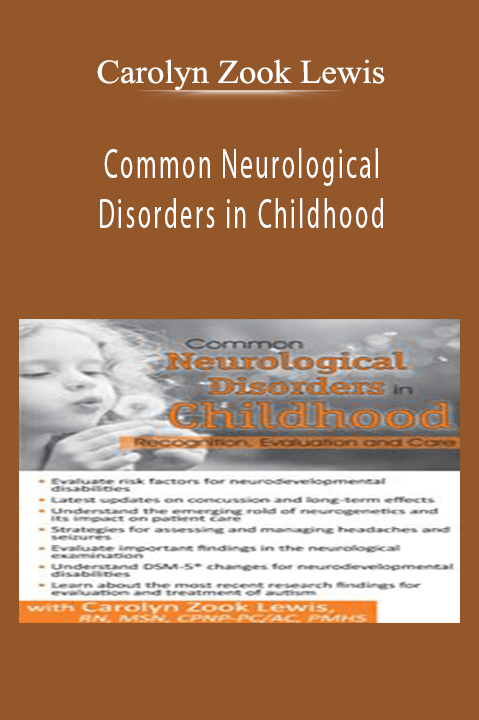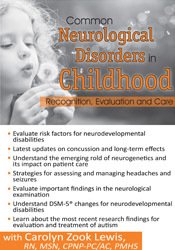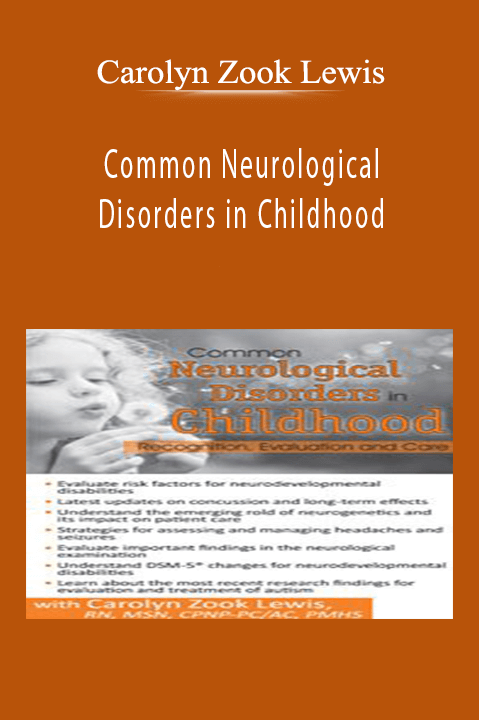Carolyn Zook Lewis – Common Neurological Disorders in Childhood: Recognition, Evaluation and Care
- Evaluate risk factors for neurodevelopmental disabilities
- Latest updates on concussion and long-term effects
- Understand the emerging role of neurogenetics and its impact on patient care
- Strategies for assessing and managing headaches and seizures
- Evaluate important findings in the neurological examination
- Understand DSM-5® changes for neurodevelopmental disabilities
- Learn about the most recent research findings for evaluation and treatment of autism
Carolyn Zook Lewis, RN, MSN, CPNP-PC/AC, PMHS, will provide up-to-date information regarding the identification, evaluation, and management of common pediatric neurological conditions. Whether you care for children with chronic neurological conditions such as epilepsy, cerebral palsy, autism, and intellectual disability, or common conditions such as headaches – you will leave this seminar and be able to use what you have learned the very next day. Carolyn has over 28 years of pediatric nursing experience, and has worked as a Pediatric Nurse Practitioner in child neurology and primary care for 19 years. Drawing from her experiences, she will share with you many insights and case studies, along with evidence-supported strategies to help you optimize the care of children and families who are coping with neurological conditions.
There have been significant advances in many aspects of neurology in the past years, and Carolyn will share with you some of changes including the emerging role of neurogenetics, the first rare but “treatable” causes of autism, and new options in the prevention of seizures. She will also help you understand the changes in the DSM-5® criteria for autism and intellectual disability.
By the end of the seminar, you will gain a better understanding of the many unique challenges facing children and families with neurodevelopmental disabilities, and be given tools to help them manage and cope with their daily struggles.
OUTLINE
The Developing Brain: Fragile, but Resilient
- Overview of brain development
- Brain malformations – causes and outcomes
- Hypoxic ischemic encephalopathy – management and long-term consequences
- Skull malformations – plagiocephaly or craniosynostosis?
- Assessment of microcephaly and macrocephaly
- Evaluation and management of hydrocephalus
Important Clues from the Neurological Evaluation
- Keys to obtaining a clinical history
- Helpful hints for the neurological exam
- Neurodiagnostic, radiologic and laboratory testing
- The emerging world of genetics
Head and Brain Injuries
- Recognize mild and more serious head injuries and when to seek medical care
- Types of head and brain injuries
- Recognize sports-related concussions and sports in which they most often occur
- Immediate and long-term effects of concussion
- Recognize and evaluate infant non-accidental trauma
- Risk factors and long-term outcomes of non-accidental trauma
Headache and Migraine in Children: What You Need to Know
- Key components to the physical, neurological and psychosocial assessment
- Taking a headache history
- Red flags and when to be concerned
- Headache triggers and prevention
- Pharmacologic and nonpharmacological management
- Rebound headache prevention and management
- Assessment and treatment of pseudotumor cerebri
Seizures: A Parent’s Worse Fear
- How to recognize a seizure
- Current recommendations for evaluation of febrile seizures
- Education and management after the first seizure
- Diagnosing and treating epilepsy
- Establishing a seizure treatment plan
Autism and Intellectual Disability
- Early signs and symptoms and assessment tools
- Diagnostic criteria for autism
- DSM-IV®- DSM-5®changes
- The evolving role of genetics
Cerebral Palsy
- Recognition and types of cerebral palsy
- Treatment options
Complex Care of the Child with Chronic Neurological Conditions and Severe Neurological Impairments
- Feeding difficulties
- Management of constipation
- Behavioral and pharmacologic strategies for promoting sleep
- Interventions for behavior management
- Healthcare monitoring
- Challenges of adolescence
- Supporting the family
- Special considerations for the child with severe neurological impairment
OBJECTIVES
- Describe factors that increase the risk for neurodevelopmental disabilities.
- Demonstrate how to recognize the signs of a serious head injury and when to seek medical attention.
- Summarize three key factors in identifying concussions.
- Explain the basic etiology, incidence, and prevalence of various types of seizures and epilepsy.
- Demonstrate essential management strategies to care for patients with headache/ migraine.
- Explain the emerging role of genetic testing in children with unexplained neurological disorders.
- Compare and contrast the differences in DSMIV® and DSM-5® diagnostic criteria and autism.
- List three considerations in working with children and families with developmental disabilities.
Instant Access Available
Product Content

Get Instant Access Carolyn Zook Lewis – Common Neurological Disorders in Childhood: Recognition Evaluation and Care at Offimc.click Now!
Delivery Information
- Upon ordering the product, a delivery email with download instructions will be sent immediately to you so that you may download your files. If you log in (or create an account) prior to purchase you will also be able to access your downloads from your account dashboard.
- It is a digital download, so please download the order items and save them to your hard drive. In case the link is broken for any reason, please contact us and we will resend the new download link to you.
- If you don't receive the download link, please don’t worry about that. We will update and notify you as soon as possible from 8:00 AM – 8:00 PM (UTC+8).
- Please Contact Us if there are any further questions or concerns you may have. We are always happy to assist!









12 reviews for Carolyn Zook Lewis – Common Neurological Disorders in Childhood: Recognition, Evaluation and Care
There are no reviews yet.